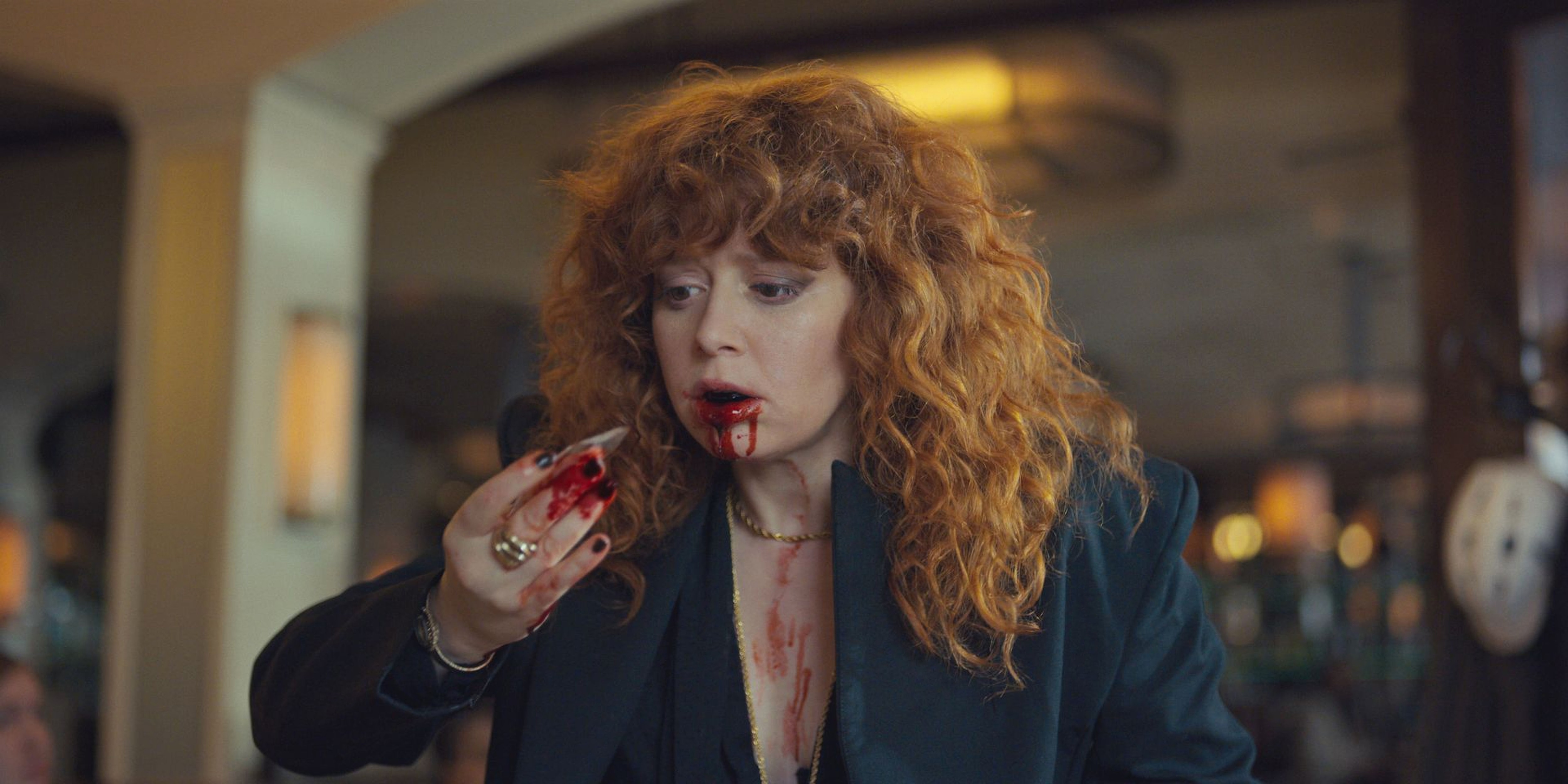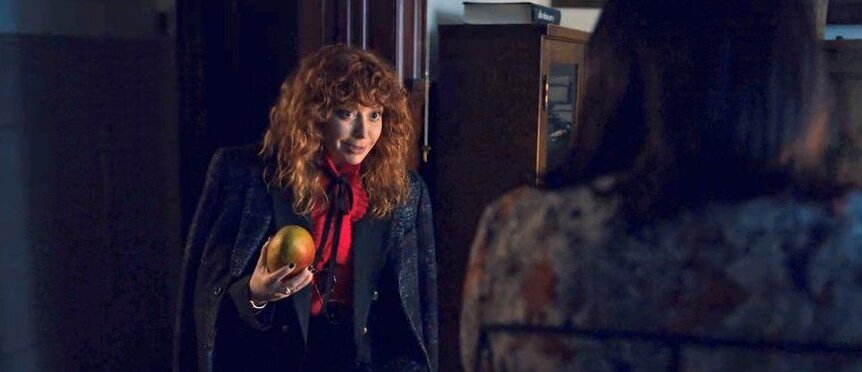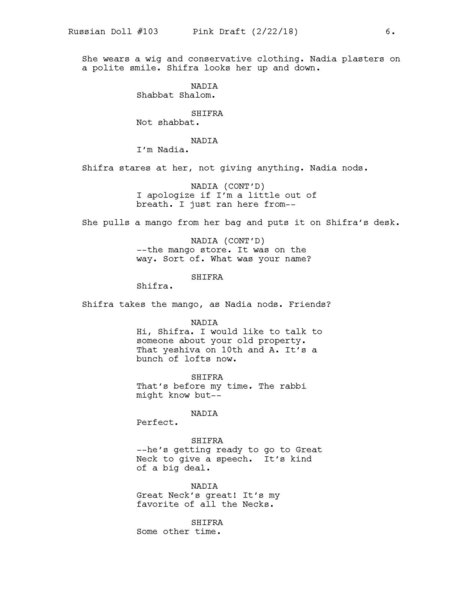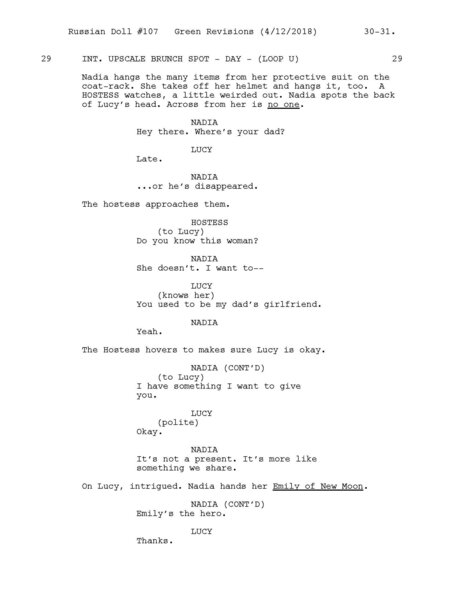Create a free profile to get unlimited access to exclusive videos, sweepstakes, and more!
Awards Contender: Russian Doll's writers ingeniously coded its life and death mystery

Welcome to Awards Contenders. This month, SYFY WIRE will be talking to the actors, directors, designers, and craftspeople whose work was featured in the best movies and TV of 2019, and who have been nominated for various awards. Today, we speak with WGA-nominated writer Allison Silverman about Russian Doll.
Russian Doll’s Nadia Vulvokov is living in a time loop, dying and cycling back to the world she just left at a prior save point, like the characters in the video games she codes for a living. Or perhaps, like one of those games, she’s crashing. In Episode 3, she embarks on a metaphysical investigation to understand why, and by Episode 7 she realizes that she and fellow looper Alan need to perform unit tests, to debug their own lives in order to fix the glitch causing the crash.
Allison Silverman, who scripted Episode 3 and co-scripted Episode 7, meticulously tracked the logic and continuity of Nadia’s world — things that might disappear, fruit that might rot. But while all that puzzle-solving can be fun, it’s the emotional story that really interested Silverman.
After ruling out drugs and mental illness as the source of her looping, Nadia investigates a possible spiritual cause — after all, her reset point, Maxine’s East Village loft, was converted from an old yeshiva. "Yeshiva students used to study the Talmud, right where you’re standing," she tells people earlier in the season. "This was once a sacred place." Nadia decides to consult the synagogue that used to own the building.
To see the rabbi, Nadia needs to get past his assistant Shifra. Nadia offers an unusual gift — a mango. You might think a mango has metaphoric power here, given Russian Doll’s preoccupation with fruit (especially watermelon), but even though fruit helps represent life and reproduction, sometimes a mango is just a mango.
"My children are obsessed with mangos," Silverman says with a laugh. "And I was kind of making Nadia a child: ‘Mangos are so good. Surely I can get whatever I want by offering a mango.’ I liked the idea of showing up with a gift to gain entry."
It’s a start. It’s also a necessary part of Russian Doll’s gameplay. When Nadia interacts with non-playable characters, she needs to offer a gift or sacrifice (although she hasn’t figured that out yet). Later in Episode 3, Nadia asks Shifra to pray for her, even though Nadia doesn’t necessarily believe in religion. Meanwhile, inside the rabbi’s office, her ex-boyfriend John gets another kind of spiritual help.
"Mysticism teaches that there is wisdom inaccessible to the intellect," the rabbi tells John. "Maybe Nadia is a way [for John] to stay distracted, to avoid the abyss. When embracing it is the only way forward."
This is also the crux of Nadia’s problem, an intellectual/mystical confluence. Says Silverman, "She’s confronted with the idea that her brain is up against something she can’t understand, and isn’t going to be able to understand until she goes into the abyss," in this case, her buried trauma.
So while Nadia enters the episode feeling in control, she learns that she needs to rethink her intellectual approach as things become more mystical. During a low point, Nadia connects with a homeless gutter punk named Horse. After they freeze to death together in Tompkins Square Park, Nadia — regenerating once again — decides to help Horse during her next reset, to try to save his life.
"What’s happening there is that we’re moving Nadia from being in intellectual control to doing some act of sacrifice," Silverman says. "She’s like, ‘I’m going to try to do something kind for him,’ and at the end of the episode, she is rewarded for that, by being introduced to a fellow traveler," i.e. Alan, who dies all the time, too.
By Episode 7, Nadia has realized why she and Alan are connected: They met each other the night they first died, but didn’t help each other. But she still takes an intellectual approach, connecting such disparate things as four-dimensionality, the theory of relativity, and coding.
"My brother-in-law is a programmer, and I talked to him to get info on bugs," Silverman says. "Bugs are featured purposely in the show — coding bugs and literal bugs. The first thing Alan does in his reset is kill a bug in his bathroom." (And don’t forget, Maxine calls Nadia a "cockroach," because she thinks Nadia cannot die.)
To break their regenerating cycles, Nadia and Alan have to reprogram their brains. For Alan, that means confronting his anxiety and self-loathing. For Nadia, that means letting go of her survivor’s guilt regarding her mother, which is the bug in her system. "These are not like flashbacks in more realistic shows," Silverman says. "These are mystical moments, and it’s more that she has to confront her past that is still living within her."
This motivates Nadia to think about another little girl, Lucy, with whom she has something in common: Both had their lives blown up by their parents — and in Lucy’s case, Nadia was at least partly responsible. So far, Nadia has avoided meeting Lucy, especially during Nadia’s death cycles. But she decides to bring the girl a gift, a book that provided her a "life force," Emily of New Moon, by L.M. Montgomery.
"In the writers' room, we talked about feeling like the strange girl in our own lives," Silverman says. "Other girls were the light girls, and we were the dark girls. And Emily of New Moon is the littler-known, darker sister to Anne of Green Gables, so it spoke to a legacy of girls allowing themselves to be pessimists."
As with the mango gift to Shifra, this gift could also be construed as a gameplay move, a transactional interaction to deliver an item in a quest, to improve your standing with a non-playable character. But in this case, "Nadia has nothing to gain," Silverman notes. In fact, "She has a lot to lose." This gift is completely selfless, "an effort to give Lucy an escape from her life, a way out of the pain she might be encountering in her home."
It’s more selfless than helping Horse or Alan — both of those cases were ultimately about helping herself, to end the looping. And it’s this act that does end the looping. This time, when Nadia dies, she gets her final reset. All the missing items in the story are restored – fruit is no longer rotten, flowers are no longer dead, mirrors are back on the walls.
"I love stories that have aspects of time travel and looping stuff," Silverman says. "But what’s happening to this person emotionally is more important than all the mapping — crossing from this side of the room to another or whatever. Ultimately, I’m interested in the characters being grounded more than understanding that every tiny detail of the repetitions is right. That’s impossible."





























